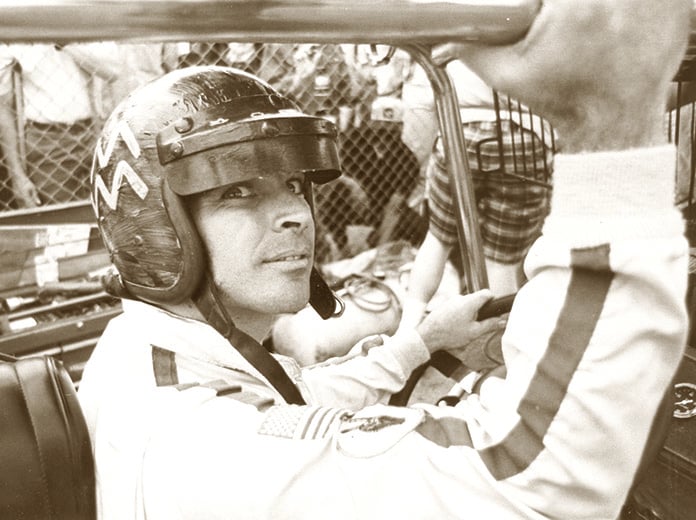Jan Opperman was one of the most colorful characters in the history of auto racing.
He was also one of the best racers to ever throw a sprint car into a turn.
Born in Long Beach, Calif., in 1939, Opperman was as well known for his hippie lifestyle as the long list of races that he won. Late in his career, he became a born again Christian and was working toward creating a Montana ranch for troubled youth.
A winner with the World of Outlaws and USAC as well as at countless short tracks from coast to coast, Opperman was also a two-time Indianapolis 500 starter.
Opperman suffered catastrophic injuries during a race at Jennerstown, Pa., on Sept. 11, 1981. His parents cared for him until he died Sept. 4, 1997.
Opperman spent much of his youth in the western region of the U.S. and began racing motorcycles in the early 1960s.
After a brief driving stint in midgets with the BCRA, Opperman began racing a sprint car in California. His first major national break came in 1968 when Hall of Fame car builder Bob Trostle gave Opperman a test in his sprint car at Iowa’s Des Moines Fairgrounds.
After a shaky start, Opperman and Trostle gelled and raced throughout the season with the IMCA, winning their second time out at Lincoln, Neb.
“He was a natural, right off,” Trostle told SPEED SPORT in 1997. “At the time he came out here. he had driven very few sprint car races, but he just had a ton of natural ability.
“He had a twinkle in his eyes … you just couldn’t get mad at the guy. He would just smile at you and you’d end up doing whatever he wanted. He could charm the socks off of people.”
Opperman and Trostle raced much of the season together, and shortly thereafter Opperman landed in the No. 4x Speedway Motors car owned by Bill Smith of Lincoln, Neb.
One year later, Opperman moved· to Beaver Springs, Pa., where he won at Williams Grove Speedway in just his second outing against the tough Pennsylvania league.
In 1972, he joined car owner Dick Bogar and along with mechanic Ralph Heintzelman won 44 main events that season. The familiar No. 99 became legendary under Opperman’s stead over the next several seasons.
A highlight of Opperman’s racing career, and for all of sprint car racing, came during those years, as he developed an intense rivalry with fellow Pennsylvania racer Kenny Weld. The bold and brave Opperman, with his long hair and hippie lifestyle, pitted against the calculating, clean-cut genius Weld, made for great publicity for the sport.
Their wheel-to-wheel duels at tracks such as Selinsgrove, Williams Grove and Lincoln Speedway became legendary.
During the 1974 season Opperman began to make forays into USAC racing and he shocked the world by winning against what was the national standard for excellence at the time. Although Opperman won regularly in USAC competition, his charismatic personality brought him friendships with many rival USAC drivers, including the 1974 and ’76 champion, Pancho Carter.
“He was a helluva race driver,” Carter said. “We had a fierce, intense rivalry, but it was clean.

“We never abused each other, we raced as hard as we could, he was talented enough that he never did intentionally to try to bang on you or knock you out of the way. But we never really got to where we didn’t like each other, at least in my mind.
“He was definitely among the best of all the guys I raced against, that’s for sure.”
Opperman’s success with USAC earned him a ride in the 1974 Indianapolis 500, aboard the Viceroy-sponsored car owned by Parnell Jones and Vel Miletich. Opperman was running 10th at the speedway when he spun and was out of the race after completing 85 laps.
He also appeared in the 1976 Indianapolis 500, finishing 16th.
During the 1976 season Opperman was back aboard Bill Smith’s Speedway Motors machine, running regularly with USAC, later landing in Bobby Hillin’s Longhorn Racing machines. It was in Hillin’s No. 12 championship machine that Opperman was seriously hurt in the 1976 Hoosier Hundred, suffering a head injury.
Opperman returned to the cockpit the following year, but never again realized the success he had previously enjoyed. He spent the next several years in a variety of cars, including the machines of Robert Vetzel, in which he made the field for the 1980 Little 500 at Anderson (Ind.) Speedway.
Opperman’s bold driving and larger-than-life personality helped pave the way for countless other “outlaw” racers, including his close friend Rick Ferkel.
“He was one of my heroes,” Ferkel told SPEED SPORT. “A lot of people probably don’t understand just how good he was. He was an unbelievable racer, just unbelievable.
“People had never before seen someone who could get in a different car, that had never really gone good before, and make it go fast immediately.
“Going up against USAC’s best and winning … he gave the outlaw racer credibility they had never had before.”
During his career Opperman won nearly every major sprint car event in America, including the Knoxville Nationals; the Western World Championship at Arizona’s Manzanita Raceway; the Florida Winternationals; and the Tony Hulman Classic at the Terre Haute (Ind.) Action Track.
He won six USAC sprint car features and was the 1974 track champion at Selinsgrove (Pa.) Speedway.
In 1990, Opperman was among the inaugural inductees into the National Sprint Car Hall of Fame.
